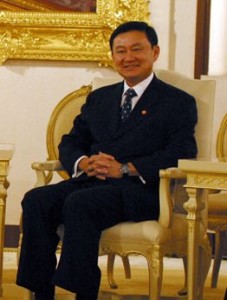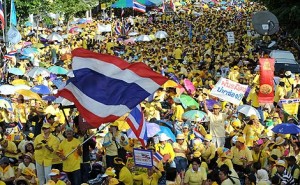…a benign (i.e., popular and bloodless) military coup is not only inherently inconsistent but also politically untenable in a democracy. After all, no matter the extent of Thaksin’s corruption (highlighted by an insider’s deal where he allegedly sold his family’s stake in a state telecommunications company to Singaporeans for $1.9 billion), constitutional provisions were in place to either impeach him or vote him out of office at elections that were due to be held within months.
[Thailand’s benign military coup…, The iPINIONS Journal, September 20, 2006]
This quote states the obvious about the use of military force to oust an allegedly corrupt leader from office. But I felt compelled to make it because Thais reacted to the 2006 military coup against Prime Minister Thaksin Shinawatra with such blithe resignation that one might have thought that military coups were sanctioned by Thailand’s constitution.
 That said, this quote also indicates my reasonable suspicion that Thaksin was guilty of many, if not all, of the allegations of corruption that purportedly forced the military to oust him.
That said, this quote also indicates my reasonable suspicion that Thaksin was guilty of many, if not all, of the allegations of corruption that purportedly forced the military to oust him.
What I did not anticipate, however, was that the coup leaders would set the oxymoronic precedent of presiding over wholly democratic institutions, including, arguably, an independent judiciary.
Indeed, it is instructive to note that while, in exile in England, Thaksin has been competing with Russian oligarchs to live more regally than the Queen, the coup leaders have been restoring parliamentary democracy to Thailand.
 Never mind that the military has been called upon to quell violent protests by demonstrators who, evidently, felt that another of Thaksin’s successor, Somchai Wongsawat, was too loyal to him; not least because the Somchai is Thaksin’s brother-in-law.
Never mind that the military has been called upon to quell violent protests by demonstrators who, evidently, felt that another of Thaksin’s successor, Somchai Wongsawat, was too loyal to him; not least because the Somchai is Thaksin’s brother-in-law.
(Incidentally, Samak Sundaravej, who succeeded Thaksin after democratic elections in December 2007, was ousted in September 2008 amidst protests that he was a Thaksin puppet. The Thai court found, somewhat expediently, that he violated conflict of interest laws. Somchai succeeded him.)
Alas, the irony that democratic Thailand has become a place where military coups are blithely tolerated but political associations (and family ties) incite national riots seems completely lost on these protesters. However, to appreciate how anathema this turn of events is, it would be as if Americans stood by as the military moved in to oust the allegedly corrupt President Richard Nixon but then rioted when word got out that his successor, Gerald Ford, was planning to pardon him.
At any rate, Thailand’s Supreme Court has proceeded to try Thaksin’s family on a battery of corruption charges. And even though his wife and her brother were convicted and sentenced to three years in prison for tax evasion in July, anti-Thaksin protesters continued to demand the resignation of Somchai’s government.
But, with the Supreme Court finding Thaksin guilty of corruption and sentencing him to two years in prison yesterday, there’s widespread hope that Somchai will be allowed to govern without any further political duress. Especially since, according to the BBC, the chief prosecutor has indicated that the government intends to ask Britain to “quickly extradite” Thaksin back to Thailand to face justice.
Not to mention that this was only the first of many pending cases against Thaksin – for which the court is expected to render similar verdicts and issue commensurate sentences.
NOTE: If the Thai government can prosecute, convict and sentence a relatively popular leader to prison on corruption charges, then surely the British government can do the same with an unpopular leader who has turned its Overseas Territory of the Turks and Caicos Islands into a Caribbean kleptocracy.
Related Articles:
Thailand’s benign military coup…
British Commission of Inquiry looms for TCI
Evidently, when A.L. Hall speaks, people should listen
Leave a Reply
You must be logged in to post a comment.